Search the Special Collections and Archives Portal
Search Results
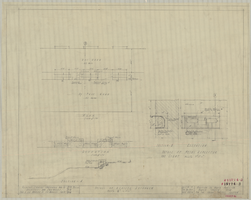
Architectural drawing of revisions to approach road at Bryce Canyon National Park, Utah, detail of revised approach, May 12, 1928
Date
Description
Plan, elevation, section, details of revised approach road at Bryce Canyon National Park, Utah. Scale 1/4""=1'-0"". Dr. by Bruce. Sheet no. 18, Job no. 350, date 5/12/28. #15774-S.
Site Name: Bryce Canyon National Park (Utah)
Image
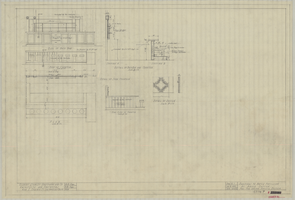
Architectural drawing of additions to pavilion at Bryce Canyon National Park, Utah, bar elevations, details, sections and plan, April 10, 1928
Date
Description
Plan, details, elevations of bar at pavilion at Bryce Canyon National Park, Utah. Scales as shown. Dr. by Gage. Tr. by Gage. Sheet no. 1, Job no. 449, date 4/10/28. #15774-T.
Site Name: Bryce Canyon National Park (Utah)
Image
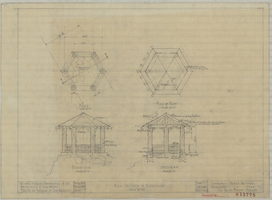
Architectural drawing of lookout point at Bryce National Monument, Bryce Canyon National Park, Utah, plan, section and elevation, January 20, 1927
Date
Description
Plan, roof plan, elevation, section of lookout gazebo at Bryce Canyon National Park, Utah. Scale 1/4""=1'-0"". Dr. by A.P.B. Tr. by A.P. B. Sheet #1, Job #383, date 1-20-27. #15775.
Site Name: Bryce Canyon National Park (Utah)
Image
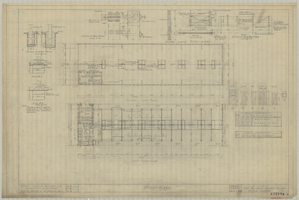
Architectural drawing of stable at Bryce Canyon National Park, Utah, floor plans, April 23, 1928
Date
Description
First and second floor plans, details, door and window schedules for stable at Bryce Canyon National Park, Utah. Scale 1/4""=1'-0"". Sheet no. 1, Job no. 453, date 4-23-28. #15776-A.
Site Name: Bryce Canyon National Park (Utah)
Image
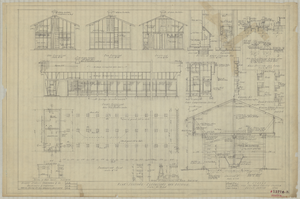
Architectural drawing of stable at Bryce Canyon National Park, Utah, elevations and details, April 23, 1928
Date
Description
Foundation plan, sections, exterior elevations, details for stable at Bryce Canyon National Park, Utah. Scale as noted. Sheet no. 2, Job no. 453, date 4-28-28. #15776-B.
Site Name: Bryce Canyon National Park (Utah)
Image
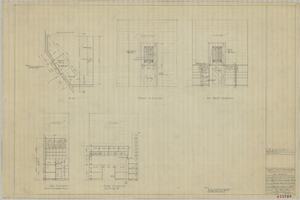
Architectural drawing of post office at pavilion at Bryce Canyon National Park, plan and elevations, Utah, April 4, 1929
Date
Description
Plan, interior and exterior elevations for post office at pavilion at Bryce Canyon National Park, Utah. "Scale 3/4" "Dr.: Cook. Tr.: Cook. Job no. 522, date 4-4-29. Revision no. 1, 5-9-29 by Bond. Sheet 1. #15780."
Site Name: Bryce Canyon National Park (Utah)
Image
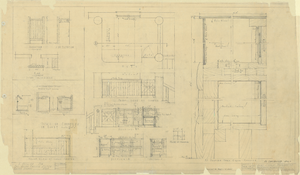
Architectural drawing of a pavilion for the Union Pacific System, Cedar Breaks, Utah, sections, elevations and details, January 4, 1928
Date
Description
Details, elevations; sections, plans for various components of the pavilion at the Cedar Breaks National Monument, Utah. "As constructed, 15706F." "Sheet no. 7, job no. 256, January 18, 1926. Revised Jan. 4, 1928 to 'as constructed.'" "Dr. by N. Bruce."
Site Name: Cedar Breaks National Monument (Utah)
Image
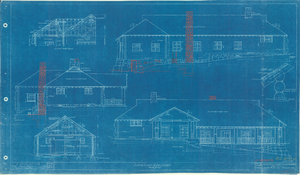
Architectural drawing of a pavilion for the Union Pacific System, Cedar Breaks, Utah, elevations and sections, May 30, 1924
Date
Description
Exterior elevations and sections for pavilion at Cedar Breaks National Monument, Utah. "As constructed, W.O. 4878A. Sheet #3, Job #256." ""Dr. by "" Blueprint
Site Name: Cedar Breaks National Monument (Utah)
Image
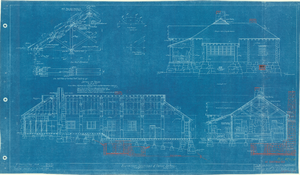
Architectural drawing of a pavilion for the Union Pacific System, Cedar Breaks, Utah, elevation sections and truss detail, May 30, 1924
Date
Description
Exterior elevations, sections and truss details for pavilion at Cedar Breaks National Monument, Utah. "As constructed W.O. 4878A. 15706-P. Sheet #4, Job #256."
Site Name: Cedar Breaks National Monument (Utah)
Image
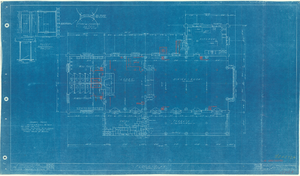
Architectural drawing of a pavilion for the Union Pacific System, Cedar Breaks, Utah, floor plan, May 30, 1924
Date
Description
Floor plan for pavilion at Cedar Breaks National Monument, Utah. "Dr. by N.B. Tr. by N.B. As constructed. W.O. 4878A, Sheet #2, Job #256. 15706B." "Scale 1/4" = 1'0'."
Site Name: Cedar Breaks National Monument (Utah)
Image
